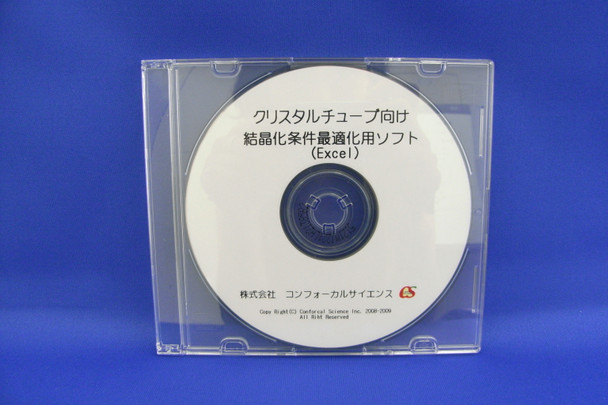Description
A Simplified Crystallization Method in the Capillary with Gel-Tube
Counter-diffusion is a crystallization method in a capillary in which a protein and a reservoir solution diffuse into each other from opposite directions.1), 2) Both the protein and the precipitant solutions are set to diffuse throughthe gel, and the concentration gradients of both solutions form in the capillary. The capillary can continuously scan a wide range of crystallization conditions unless crystallization occurs. By fixing the precipitant concentration higher, you canscan a wider range of crystallization conditions. Therefore, a single capillary may be equivalent to many drops in the vapor-diffusion method.
Principle: The crystallization using Crystal-Tube is based on the counter-diffusion method. A capillary is filled with protein solution and a piece of gel-tubing (gel-tube) is attached to the end of the capillary. The capillary is placed into a test tube in which a reservoir solution is poured.
Feature and Advantages]Size: Very little space is required for crystallization set-up.
Easy Set-up: The Gel-tube already contains agarose in the silicon tube,
making the crystallization set up very easy.
Small Protein Sample: Only 2 micro-L per screening. Only 10 micro-L per diffractive-grade crystal.
Favorable Crystallization Conditions: The timing of crystallization can be controlled by Gel-tube length, the amount of protein solution in a capillary, and the concentration of protein and precipitant solution.
High Reproducibility and Reliability: JAXA uses this method for crystallization in space. After crystallizing over 400 different proteins, the Crystal Tube kit has proven its reliability and high reproducibility.
Long-term Stability of Crystals: Crystals grown in the capillary arestable over the long term, making it easy to soak crystals with another compound, such as a ligand or cryoprotectant.
Membrane Protein Crystallization: Phase separation due to concentrated detergent in the solution does not occur.
View AllClose
Principle: The crystallization using Crystal-Tube is based on the counter-diffusion method. A capillary is filled with protein solution and a piece of gel-tubing (gel-tube) is attached to the end of the capillary. The capillary is placed into a test tube in which a reservoir solution is poured.
Feature and Advantages]Size: Very little space is required for crystallization set-up.
Easy Set-up: The Gel-tube already contains agarose in the silicon tube,
making the crystallization set up very easy.
Small Protein Sample: Only 2 micro-L per screening. Only 10 micro-L per diffractive-grade crystal.
Favorable Crystallization Conditions: The timing of crystallization can be controlled by Gel-tube length, the amount of protein solution in a capillary, and the concentration of protein and precipitant solution.
High Reproducibility and Reliability: JAXA uses this method for crystallization in space. After crystallizing over 400 different proteins, the Crystal Tube kit has proven its reliability and high reproducibility.
Long-term Stability of Crystals: Crystals grown in the capillary arestable over the long term, making it easy to soak crystals with another compound, such as a ligand or cryoprotectant.
Membrane Protein Crystallization: Phase separation due to concentrated detergent in the solution does not occur.






